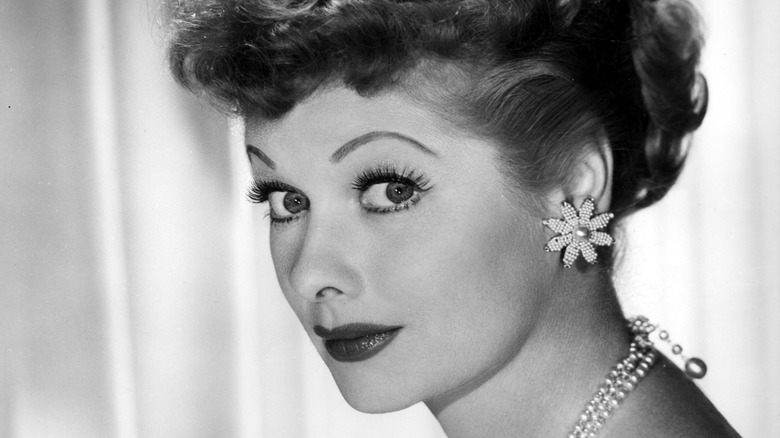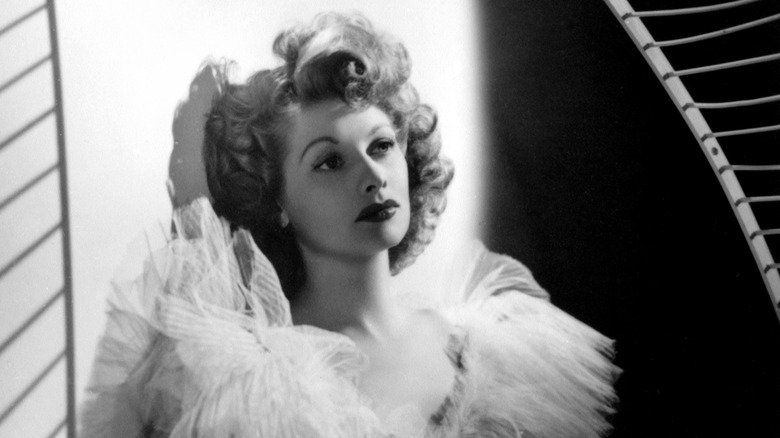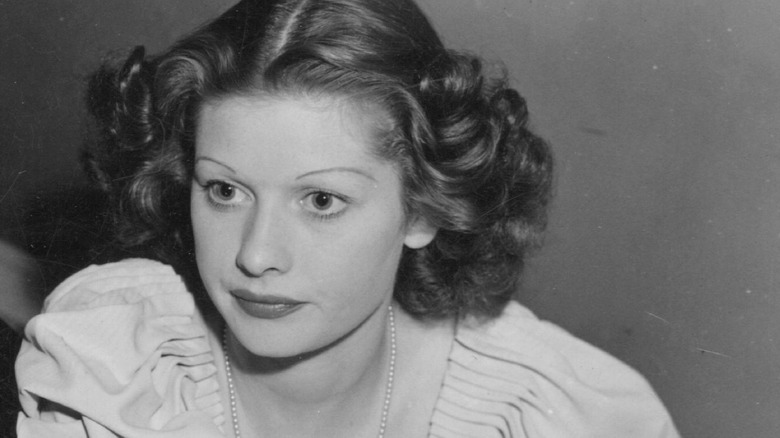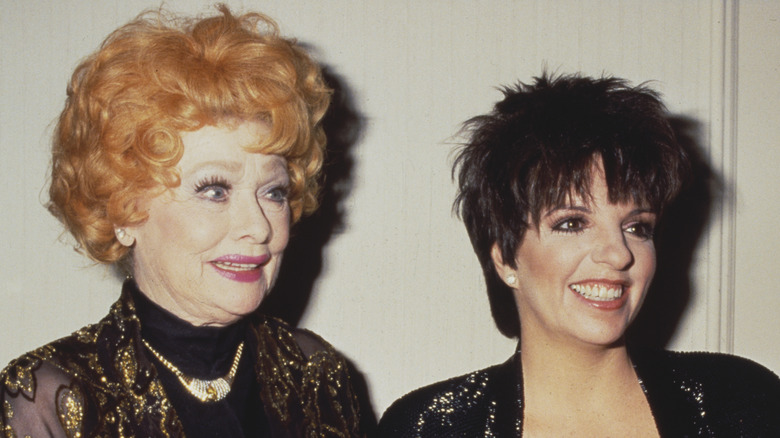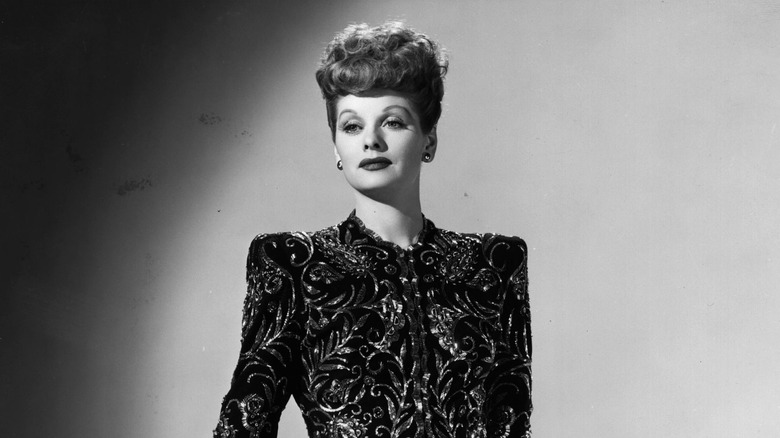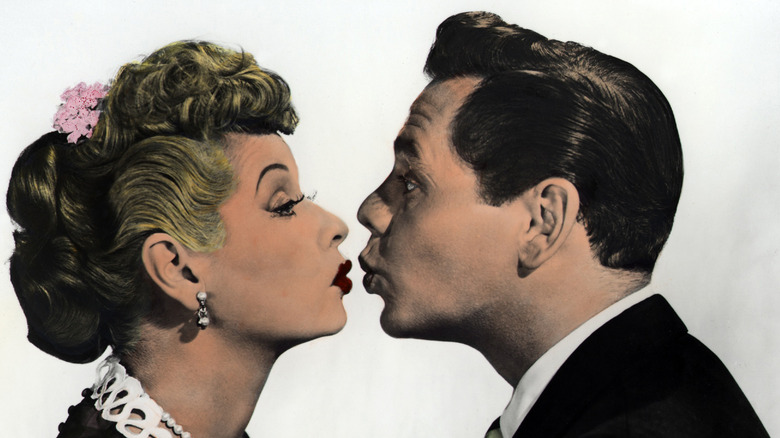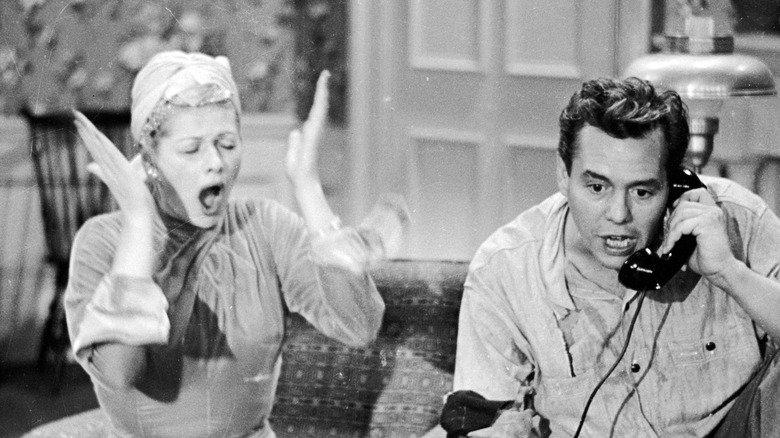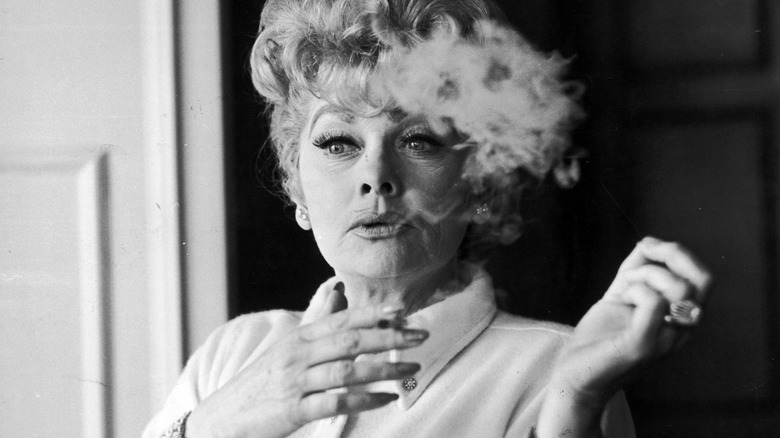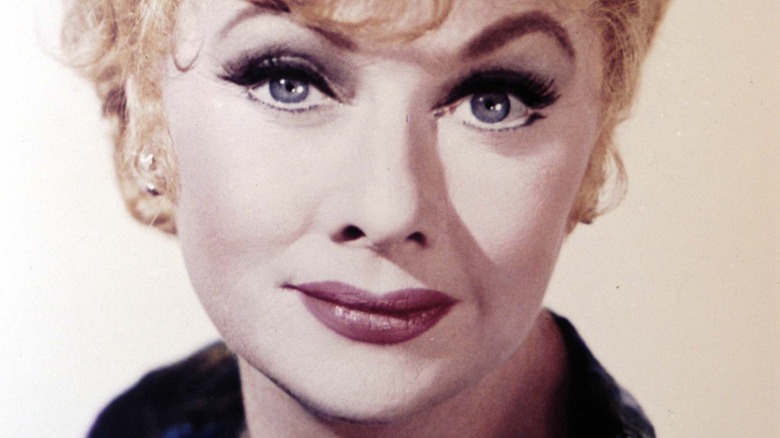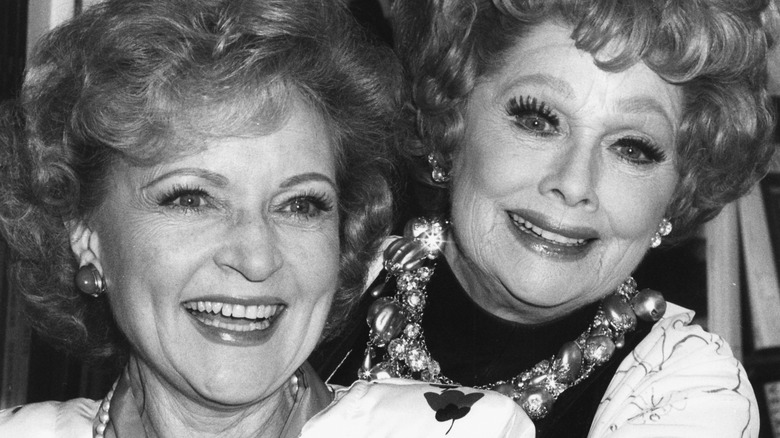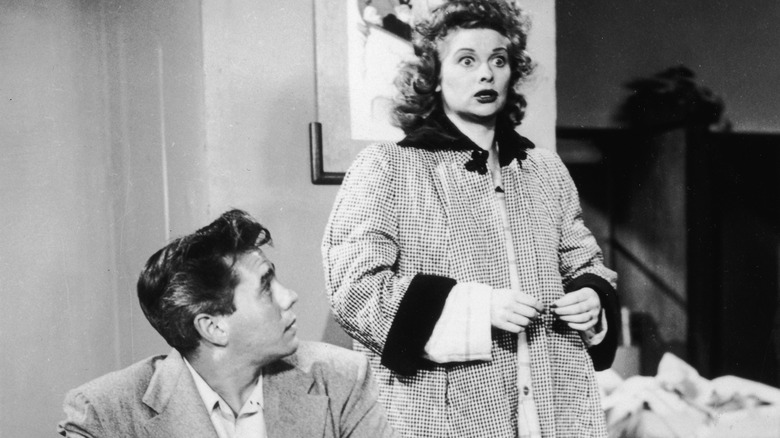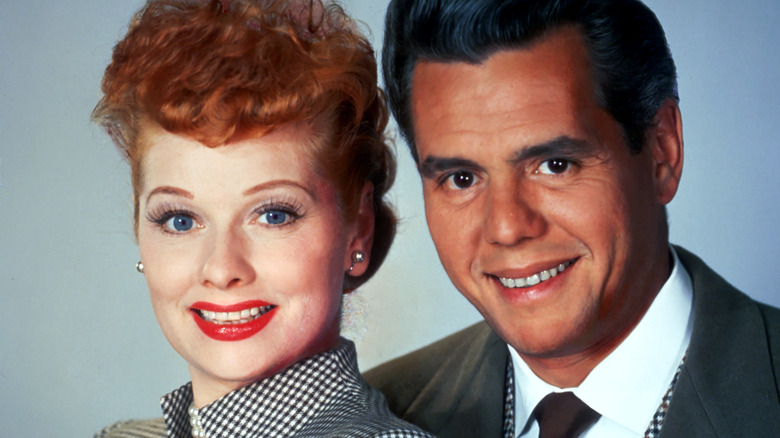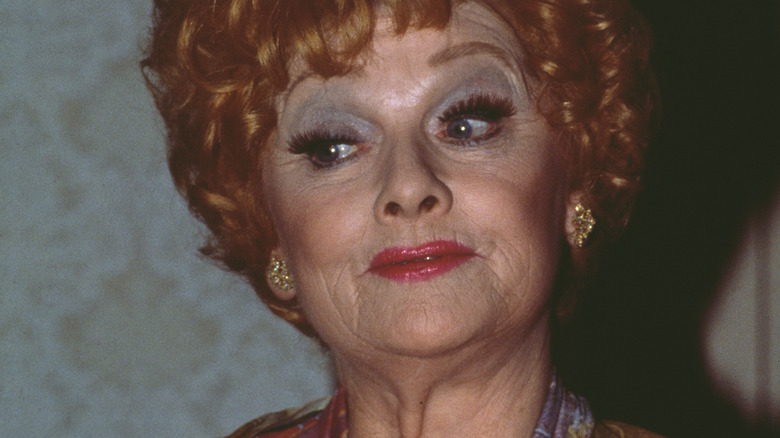Inside The Life Of Lucille Ball
Most people young and old know who Lucille Ball is. The red-headed actress was one of comedy's most beloved stars. According to Turner Classic Movies, Ball did not think she was a natural talent. She couldn't dance or sing and lacked "flair," so she developed other strengths that made her stand out. And stand out she did, particularly when it came to slapstick humor and her natural ability to make people laugh. Ball also broke a lot of ground when it came to television programming. She introduced audiences to concepts and situations they had never seen before. In addition to being funny, she was a shrewd business woman who paved the way for other women in Hollywood.
Ball starred in over 80 films during her career but is most known for her iconic TV series "I Love Lucy," which was one of the most popular TV shows of the day and continues to draw laughs today from viewers old and new. Nicole Kidman is playing the star in the biopic "Being the Ricardos," demonstrating that Ball's larger-than-life persona is worth depicting on the big screen over 30 years after her death. Here is a look inside the life of Lucille Ball.
Lucille Ball had a difficult childhood
Desiree Ball gave birth to Lucille Ball on August 6, 1911, in Jamestown, New York. Lucille's father, Henry, also known as Had, was an electrician. Shortly after Lucille was born, the family moved to Montana so Henry could find work, according to Biography. Then they relocated to Michigan for a job opportunity at the Michigan Bell Company. In 1915, Lucille's father got typhoid fever and passed away. Lucille was not even 4 years old. Her younger brother, Fred, was born later the same year.
Some of Lucille's earliest memories took place during that time period. She noted how she remembered "hanging out the window, begging to play with the kids next door who had measles, the doctor coming, my mother weeping." After her father's death, the family moved back to Jamestown, and her mother married a man named Ed Peterson, who didn't like children and didn't want to live with them. As a result, Peterson and Desiree moved to Detroit, while Lucille moved in with her stepfather's parents, and her brother lived with his maternal grandparents. Lucille's life was threadbare as the Petersons couldn't even afford to pay for pencils for school.
She was deemed 'too shy' to be successful in entertainment
Most people remember Lucille Ball as a gregarious, outgoing personality, at least in the roles that she played on television. But Lucille wasn't an extrovert when she was just starting out in the business. She moved back in with her mother at age 11 and by 15 persuaded Desiree Ball to permit her to apply to a New York City drama school. While Lucille was interested in acting, she was a bit shy when it came to actually performing, according to Biography.
Lucille said of the experience, "I was a tongue-tied teenager spellbound by the school's star pupil, Bette Davis." Davis, of course, became one of film's most notable stars. School administrators eventually told Lucille's mother that her daughter was "wasting her time and ours." They added, "She's too shy and reticent to put her best foot forward." This did not deter Lucille, and instead of giving up her acting dreams she stayed in the Big Apple. Lucille got modeling gigs in the late 1920s for fashion designer Hattie Carnegie and Chesterfield cigarettes. She then set her sights on Hollywood. She landed a job promoting the 1933 film "Roman Scandals" and became an extra in "The Three Musketeers." She also appeared in "Stage Door" with Katharine Hepburn and Ginger Rogers.
She wasn't a natural redhead
Lucille Ball is synonymous with red hair, but she didn't always have ginger locks. She was a natural brunette and even had blonde hair before hair stylist Sydney Guilaroff made the ingenious move to turn the actress into a redhead, according to Yahoo. And, no, Ball didn't wear a wig. However, it was a challenge to maintain her hair style. According to one of her stylists, Irma Kusely, Ball's hair was actually golden apricot, not red. Kusely explained, "I used regular hair dye [to color it], and then a henna rinse, which she was famous for. She had a safe of [the henna] in my garage."
Ball discovered the best way to keep her red head in tip top condition while spending time in Las Vegas. She met a man who learned about her hair issues and sent her a large box of henna to make the process easier. According to Healthline, henna provides a rich-colored look to hair and helps make it glossy. It's known as mendhikā in Sanskrit and works as both a dye and a way to enrich brown and auburn hair.
She was the first woman to lead a major Hollywood studio
Lucille Ball and her husband, Desi Arnaz, created Desilu Studios, which, during the late 1950s, was the top television production company around, details the Lucy Desi Museum. From producing Ball's namesake show "I Love Lucy" to other classics like "Mission: Impossible," "The Andy Griffith Show," and "The Dick Van Dyke Show," Desilu Studios had a penchant for choosing projects that challenged cultural and societal norms. It also incorporated the latest technology in its programming
Ball bought Arnaz's interest in the production company in 1962, which made her the first female to lead a major Hollywood studio. She was able to channel her talent into the company during the 1960s when media was evolving. She also set the stage for today's women in entertainment. Reese Witherspoon founded media company Hello Sunshine, while Margot Robbie launched the production company LuckyChap Entertainment, according to Pitt News. Ball was a pioneer when she took over Desilu Studios, and today's Hollywood stars can credit her for blazing the trail.
She was 40 when 'I Love Lucy' first aired
Lucille Ball appeared in several films in her younger years, but her comedic skills didn't really make an impression until she landed a radio job, according to The Sydney Morning Herald. The program, "My Favorite Husband," was broadcast on CBS Radio. Ball believed the radio show could be converted into a television program, but not everyone was on board. So she and her husband, Desi Arnaz, created an act that they took on the road. Arnaz played with his band, while Ball acted out comedy routines. Their act became a hit, and it resulted in the series "I Love Lucy."
What people may not realize is that Ball was 40 years old when the show first went on the air. Today, few TV programs are centered on women of that age, and during the 1950s it was unheard of. However, Ball's talent and vibrant on-screen persona obviously made up for the fact that she was older than her contemporaries. As per USA Today, a 2021 study found that ageism continues to be prevalent today. When it comes to film roles in particular, in 2020, most female characters were in their 20s and 30s, while most males were in their 30s and 40s. So, you can see how groundbreaking it was for Ball to achieve such success with her work "later" in life.
Lucille Ball didn't think she was funny
If you've ever seen an episode of "I Love Lucy," you probably laughed at some point. She was a riot in episodes such as "Job Switching," in which she and her friend Ethel worked in a chocolate factory. It can be hard to keep a straight face when watching the pair stuff chocolate into their mouths and clothing when the conveyor belt goes faster and faster. The "Vitameatavegamin" episode was also hilarious, as Lucy got drunk while tasting a health tonic for a commercial.
Interestingly, Lucille Ball didn't think she was funny. She said as much to Rolling Stone in 1983 (via the Los Angeles Times), explaining, "My writers were funny. My directors were funny. The situations were funny. ... What I am is brave. I have never been scared. Not when I did movies, certainly not when I was a model and not when I did 'I Love Lucy.'" While she didn't give her comedic skills much credit, Ball was funny, especially in episodes such as "Lucy's Italian Movie," in which she stomped grapes and got into a fight while doing so.
She was connected to the Communist Party
If you're curious about Lucille Ball's political affiliations, you may be surprised to learn that in 1936 she registered to vote as a member of the Communist Party, according to Bustle. Despite her political leanings, it did not affect her career. Rena Vale, a former screenwriter and an investigator for the House Un-American Activities Committee (HUAC), testified that a Communist Party meeting was hosted at the star's home in 1937. Ball was not present at the meeting and claimed she did not participate in any activities related to the party. However, the FBI determined that she was a delegate for the party's State Committee and took part in party-related radio broadcasts in 1940.
When pressed about her involvement with the Communist Party, Ball and her husband Desi Arnaz claimed she registered only to please her socialist-leaning grandfather. Arnaz also passionately defended his wife, proclaiming she wasn't and never would be a Communist. Fortunately for her career, Ball was not blacklisted like so many others in Hollywood were at the time, largely because she was such a beloved actress. People gave her a pass despite evidence that she had connections to communism.
Were it not for Lucille Ball, 'Star Trek' would never have aired
Lucille Ball was interested in buying a series specifically so Desliu Studios would have a show to call its own. While several TV programs were filmed by her company, it didn't own most of them. So, when producer Herb Solow approached Ball with the sci-fi series "Star Trek," she saw an opportunity, according to Inverse. Since Ball and Desi Arnaz created the process of syndication (reruns), she had the foresight to see that the same concept would work well with "Star Trek: The Original Series." This despite the fact that Ball reportedly didn't understand the premise of the series, according to StarTrek.com.
As Inverse details, while the original "Star Trek" only aired for three seasons, it truly shined in reruns. During the 1970s, the program aired in syndication, which boosted its popularity and eventually turned it into a cult TV series. Ball had nothing to do with the creative aspects of "Star Trek," but she was instrumental in providing its financial backing. TV execs rejected the pilot episode, but Ball was so confident in the show that she paid for a revamped pilot. This type of thing did not happen in 1965 and rarely occurs today. "Star Trek: The Next Generation" actress Gates McFadden narrated the documentary, "The Center Seat," and stated, "Without the bravery and determination of Lucille Ball, who defined Hollywood and expectations, well, Star Trek probably wouldn't exist at all."
She was BFFs with Betty White
Celebrity friendships can be fascinating, including the one between Lucille Ball and Betty White, who's known for her roles on "The Golden Girls" and "The Mary Tyler Moore Show." The women met in the late 1950s and instantly fostered a strong connection, with their friendship lasting over 30 years. The pair both worked on radio and television and even owned production companies, which was a rarity during that era. Their shared experiences was a common thread.
White talked to The Atlantic about her pal and noted that one activity the redhead was always trying to teach her was backgammon. It never quite worked out because Ball wasn't exactly the best teacher. Even so, the pair "played" the game frequently, and it was a lot of fun, according to White. But that's just a small reason why the twosome remained friends for so many years. Those who spent time with the women noticed their chemistry. Ann Dusenberry, who appeared on "Super Password" with White and "Life With Lucy" with Ball, told Closer, "Their bond was their common accomplishment as business women in a male-dominated industry."
Ball's former co-star, Keith Thibodeaux, who played little Ricky on "I Love Lucy," claimed the pair were so close because Ball admired White's "fighting spirit." In addition, they were both feminists, which was unusual in Hollywood at the time.
She broke TV boundaries
In the early 1950s, the idea of seeing a pregnancy on television was unfathomable. But that all soon changed with the December 8, 1952, airing of when the "I Love Lucy" episode "Lucy is Enceinte" on CBS, according to the Huffington Post. In the episode, Lucy and Ricky learned they were going to be parents. For the first time in history, a pregnant woman was portrayed on television, a groundbreaking moment for Lucille Ball. However, the word "pregnant" was never uttered during the episode because it was considered "vulgar," according to AV Club editor Genevieve Koski. At the time, the episode was a bit shocking because of its content matter. But it paid off in the long run: When little Ricky was born during an episode on January 19, 1953, 44 million viewers watched, report the Huffington Post. To put that in perspective, the No. 1 show of the first week of December 2021 was NFL Sunday night football with 18.5 million viewers.
Another way in which Ball broke TV boundaries was by insisting that her Cuban-immigrant husband Desi Arnaz play her on-screen husband in "I Love Lucy." According to the Television Academy, TV execs feared that viewers would not believe a white woman would have such a close relationship with a Hispanic man, but Ball threatened to walk if Arnaz wasn't included. Arnaz helped audiences accept his character because he was an excellent comedian, and he poked fun at himself and his struggles to fit in with the American way of life.
Despite their divorce, Desi Arnaz was the love of Lucille Ball's life
Lucille Ball and Desi Arnaz divorced after nearly two decades together, but the pair reportedly remained soulmates for the rest of their lives, according to several sources. They had two children but split up in 1960 due to Arnaz's alcoholism and womanizing ways, reports the The Guardian. Author and playwright Lee Tannen was friends with Ball and told the publication, "The day Desi died was the day she started dying. It was such a love affair that unquestionably she loved him until the day she died. And I believe he loved her."
"The Queen of Tuesday: A Lucille Ball Love Story" author Darin Strauss told CBS News that Ball and Arnaz were a perfect couple who loved each other very much, except they couldn't live together. He believes that Arnaz was unequivocally the love of Ball's life. Granddaughter Kate Luckinbill also claims the pair had a special bond and "were connected by their souls." She added that her grandparents were "completely, madly, deeply" in love until their deaths.
She starred in over 80 films and other Lucy-centered TV series, the last of which bombed
When Lucille Ball first set her sights on Hollywood, she appeared in several films and had some heavy-hitter co-stars, including Henry Fonda, Judy Garland, and Ginger Rogers, according to The Sydney Morning Herald. Early on in her career, she appeared in quick succession in films such as "Roman Scandals," "Blood Money," and Kid Millions," according to Britannica. She gradually landed larger roles, including 1950's "Fancy Pants" alongside Bob Hope. She starred in more than 80 films during her career. While she was making "I Love Lucy," she even appeared with husband Desi Arnaz in a few comedies, such as 1954's "The Long, Long Trailer."
After Ball divorced Arnaz in 1960, she returned to the small screen with "The Lucy Show," which aired from 1962 to 1968, and followed it up with "Here's Lucy," which aired from 1968 to 1974. Her last TV program, "Life with Lucy," was unfortunately a failure and only stayed on air for two months in 1986. Neither critics nor viewers liked the show, and it was Ball's last role before she died at the age of 77, according to Outsider. Fortunately, Ball's legacy is connected to her most beloved sitcom, "I Love Lucy," one of TV's most iconic shows of all time.
